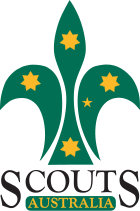Scouts Australia is an organisation for children and young adults from 6 to 26 years of age. Scouts
Australia is part of the global
Scouting movement and national member of the
World Organization of the Scout Movement since 1953.
Boys in the Commonwealth of Australia were involved in Scouting as early as 1908 , the year the first Boy Scout training handbook "Scouting for Boys" was published in England. The visits made to Australia by Baden-Powell in 1912 and in later years (1927, 1931 and 1934) encouraged the extension of the Movement in Australia.
Although each state branch in Australia was directly and individually responsible to Imperial headquarters in London, there grew up a desire to achieve co-operation at headquarters level and so a federal council of nominees from each state council was formed in 1922. This body later appointed an Australian Commissioner.
For more than 30 years, Scouting was coordinated by the Australian Federal Scout Council, which functioned as a Branch of the British Boys Scout Association. In 1958 the adjuration of the Australian Boys Scout Association took place and in 1967 the national organisation was incorporated by Royal Charter. The public name of the association was changed to the Scout Association of Australia in 1971, when girls were first admitted, although the official name was not changed until 2001, when the Royal Charter was amended through an Act of Parliament. The Organisation is now known as 'Scouts Australia', however its formal title remains The Scout Association of Australia.
Scouts Australia is a 'federation' made up of branches that operate in each Australian state and territory. Each branch is completely separate, maintaining its own structure and operational methodologies and rules, however all operate under a common uniform and common award scheme structure. How each branch chooses to structure itself down to individual Group level remains the prerogative of the relevant Branch.
The Chief Scout of Australia is the Australian Governor General, who is the representative in Australia of the Monarch (currently Her Majesty, Queen Elizabeth II). The Chief Scout in each state is normally the State Governor, who is also the Monarch's representative in each State.
Australia was made a member of the World Scout Organisation of Scout Movements (WOSM) in 1953 and is a Founder Member of the Asia-Pacific Region. In the field of support and co-operation with other member countries of the Asia Pacific Region, the organisation has contributed to a number of international friendship and community development orientated projects.
Over the years, Australian Scouts have supported emerging Scout Associations in the South Pacific. A twinning project with the Bangladesh Scouts, known as the "Bangladesh-Australia Child Health" (BACH) project made a dramatic impact on child health in project villages during its operation from 1986 to 1992. The Scout Association has a twinning project with the Nepal Scouts known as NATURE Project and involves the reforestation of the Kristi Landslide.
Australia hosted the successful 16th World Scout Jamboree and the 31st World Scout Conference in 1988. Some 15,000 Scouts from 94 countries attended the Jamboree at Cataract Scout Park near Sydney. An Australian Scout Jamboree has been held every three years since 1934 except for the years of the Second World War. The scout jamboree is the largest national scout event but there is also an Australian Rover Moot and an Australian Venture are also held every three years.
Scouts Australia created a youth forum in 2001, called the National Youth Council. It contains 30 members from the scout, venturer, and rover youth ages.The only member of the council who is an adult leader is the National Youth Council Adviser. It works with issues that affect the youth members, such as the Venturer Review (2007), the badge system, peer pressure and is designed to provide a connection between youth members and the management of the association.
In 2003 Scouts Australia became a Registered Training Provider under the banner of the Federal Dept. of Science, Technology and Training. Scouts Australia's Adult Leader Training now leads Adults to a Diploma of Leadership under the Australian Qualifications Framework.
According to its own Annual Reports membership has decreased in all sections from a total of 84,502 in 2126 Groups in 2001 to a total of 63,200 in 1836 Groups in 2005, although membership of the Venturer and Rover sections increased slightly from 2004 to 2005.








